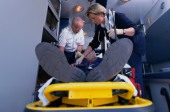
TUESDAY, Nov. 10 (HealthDay News) — Lying face down instead of face up while receiving mechanical ventilation doesn’t lower the risk of death for patients with acute respiratory distress syndrome (ARDS), according to Italian researchers.
Prone, or face-down, positioning is recommended for patients with ARDS, a serious and often fatal lung condition that may be associated with severe hypoxemia (abnormally low levels of oxygen in the blood, resulting in shortness of breath), according to background information in the study.
“Moreover, prone positioning has been advocated as a rescue maneuver for severe hypoxemia, owing to its positive effects on oxygenation, which have been repeatedly documented since its first description in 1976. However, no randomized clinical trial has yet demonstrated a significant reduction in mortality rate associated with prone positioning,” wrote Dr. Paolo Taccone and colleagues.
Their study, published in the Nov. 11 issue of the Journal of the American Medical Association, included 342 adult patients with ARDS receiving mechanical ventilation, including 192 with moderate hypoxemia and 150 with severe hypoxemia. The patients were randomly selected to be prone or supine (face up) during ventilation.
Death rates for the prone and supine patients after 28 days were 31 percent and 32.8 percent, respectively, and 47 percent and 52.3 percent, respectively, after six months. Patients in the prone group had much higher complication rates, the study authors noted.
“Outcomes were also similar for patients with moderate hypoxemia in the prone and supine groups at 28 days (25.5 percent versus 22.5 percent) and at six months (42.6 percent versus 43.9 percent). The 28-day mortality of patients with severe hypoxemia was 37.8 percent in the prone and 46.1 percent in the supine group, while their six-month mortality was 52.7 percent and 63.2 percent, respectively,” the researchers wrote.
“Do the findings of this trial, together with those of previous studies, represent the end of the prone position technique? Undoubtedly, the data of the present trial together with previous results clearly indicate that prolonged prone positioning, in the unselected ARDS population, is not indicated as a treatment. However, its potential role in patients with the most severe hypoxemia, for whom the possible benefit could outweigh the risk of complications, must be further investigated, considering the strong pathophysiological background, the post hoc result of our previous study, the most recent meta-analysis, and the favorable trend observed prospectively in this study,” Taccone and colleagues concluded.
More information
The U.S. National Heart, Lung, and Blood Institute has more about ARDS.

